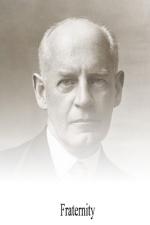The wild force which every year visits the world, driving with its soft violence snowy clouds and their dark shadows, breaking through all crusts and sheaths, covering the earth in a fierce embrace; the wild force which turns form to form, and with its million leapings, swift as the flight of swallows and the arrow-darts of the rain, hurries everything on to sweet mingling—this great, wild force of universal life, so-called the Spring, had come to Mr. Stone, like new wine to some old bottle. And Hilary, to whom it had come, too, watching him every morning setting forth with a rough towel across his arm, wondered whether the old man would not this time leave his spirit swimming in the chill waters of the Serpentine—so near that spirit seemed to breaking through its fragile shell.
Four days had gone by since the interview at which he had sent away the little model, and life in his household—that quiet backwater choked with lilies—seemed to have resumed the tranquillity enjoyed before this intrusion of rude life. The paper whiteness of Mr. Stone was the only patent evidence that anything disturbing had occurred—that and certain feelings about which the strictest silence was preserved.
On the morning of the fifth day, seeing the old man stumble on the level flagstones of the garden, Hilary finished dressing hastily, and followed. He overtook him walking forward feebly beneath the candelabra of flowering chestnut-trees, with a hail-shower striking white on his high shoulders; and, placing himself alongside, without greeting—for forms were all one to Mr. Stone—he said:
“Surely you don’t mean to bathe during a hail storm, sir! Make an exception this once. You’re not looking quite yourself.”
Mr. Stone shook his head; then, evidently following out a thought which Hilary had interrupted, he remarked:
“The sentiment that men call honour is of doubtful value. I have not as yet succeeded in relating it to universal brotherhood.”
“How is that, sir?”
“In so far,” said Mr. Stone, “as it consists in fidelity to principle, one might assume it worthy of conjunction. The difficulty arises when we consider the nature of the principle .... There is a family of young thrushes in the garden. If one of them finds a worm, I notice that his devotion to that principle of self-preservation which prevails in all low forms of life forbids his sharing it with any of the other little thrushes.”
Mr. Stone had fixed his eyes on distance.
“So it is, I fear,” he said, “with ‘honour.’ In those days men looked on women as thrushes look on worms.”
He paused, evidently searching for a word; and Hilary, with a faint smile, said:
“And how did women look on men, sir?”
Mr. Stone observed him with surprise. “I did not perceive that it was you,” he said. “I have to avoid brain action before bathing.”




